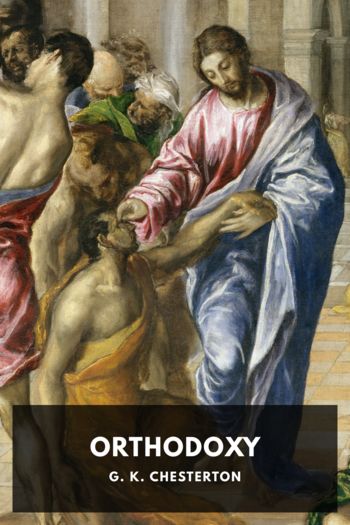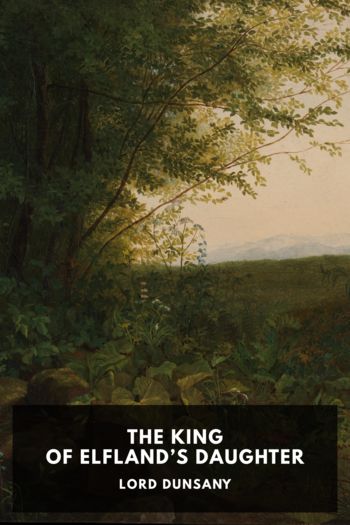Orthodoxy - G. K. Chesterton (literature books to read .txt) 📗

- Author: G. K. Chesterton
Book online «Orthodoxy - G. K. Chesterton (literature books to read .txt) 📗». Author G. K. Chesterton
The worship of will is the negation of will. To admire mere choice is to refuse to choose. If Mr. Bernard Shaw comes up to me and says, “Will something,” that is tantamount to saying, “I do not mind what you will,” and that is tantamount to saying, “I have no will in the matter.” You cannot admire will in general, because the essence of will is that it is particular. A brilliant anarchist like Mr. John Davidson feels an irritation against ordinary morality, and therefore he invokes will—will to anything. He only wants humanity to want something. But humanity does want something. It wants ordinary morality. He rebels against the law and tells us to will something or anything. But we have willed something. We have willed the law against which he rebels.
All the will-worshippers, from Nietzsche to Mr. Davidson, are really quite empty of volition. They cannot will, they can hardly wish. And if anyone wants a proof of this, it can be found quite easily. It can be found in this fact: that they always talk of will as something that expands and breaks out. But it is quite the opposite. Every act of will is an act of self-limitation. To desire action is to desire limitation. In that sense every act is an act of self-sacrifice. When you choose anything, you reject everything else. That objection, which men of this school used to make to the act of marriage, is really an objection to every act. Every act is an irrevocable selection and exclusion. Just as when you marry one woman you give up all the others, so when you take one course of action you give up all the other courses. If you become King of England, you give up the post of Beadle in Brompton. If you go to Rome, you sacrifice a rich suggestive life in Wimbledon. It is the existence of this negative or limiting side of will that makes most of the talk of the anarchic will-worshippers little better than nonsense. For instance, Mr. John Davidson tells us to have nothing to do with “Thou shalt not”; but it is surely obvious that “Thou shalt not” is only one of the necessary corollaries of “I will.” “I will go to the Lord Mayor’s Show, and thou shalt not stop me.” Anarchism adjures us to be bold creative artists, and care for no laws or limits. But it is impossible to be an artist and not care for laws and limits. Art is limitation; the essence of every picture is the frame. If you draw a giraffe, you must draw him with a long neck. If, in your bold creative way, you hold yourself free to draw a giraffe with a short neck, you will really find that you are not free to draw a giraffe. The moment you step into the world of facts, you step into a world of limits. You can free things from alien or accidental laws, but not from the laws of their own nature. You may, if you like, free a tiger from his bars; but do not free him from his stripes. Do not free a camel of the burden of his hump: you may be freeing him from being a camel. Do not go about as a demagogue, encouraging triangles to break out of the prison of their three sides. If a triangle breaks out of its three sides, its life comes to a lamentable end. Somebody wrote a work called “The Loves of the Triangles”; I never read it, but I am sure that if triangles ever were loved, they were loved for being triangular. This is certainly the case with all artistic creation, which is in some ways the most decisive example of pure will. The artist loves his limitations: they constitute the thing he is doing. The painter is glad that the canvas is flat. The sculptor is glad that the clay is colourless.
In case the point is not clear, an historic example may illustrate it. The French Revolution was really an heroic and decisive thing, because the Jacobins willed something definite and limited. They desired the freedoms of democracy, but also all the vetoes of democracy. They wished to have votes and not to have titles. Republicanism had an ascetic side in Franklin or Robespierre as well as an expansive side in Danton or Wilkes. Therefore they have created something with a solid substance and shape, the square social equality and peasant wealth of France. But since then the revolutionary or speculative mind of Europe has been weakened by shrinking from any proposal because of the limits of that proposal. Liberalism has been degraded into liberality. Men have tried to turn “revolutionise” from a transitive to an intransitive verb. The Jacobin could tell you not only the system he would rebel against, but (what was more important) the system he would not rebel against, the system he would trust. But the new rebel is a sceptic, and will not entirely trust anything. He has no loyalty; therefore he can never be really a revolutionist. And the fact that he doubts everything really gets in his way when he wants to denounce anything. For all denunciation implies a moral doctrine of some kind; and the modern revolutionist doubts not only the institution he denounces, but the doctrine by which he denounces it. Thus he writes one book complaining that imperial oppression insults the purity of women, and then he writes another book (about the sex problem) in which he insults it himself. He curses the Sultan because Christian girls lose their virginity, and then curses Mrs. Grundy because they keep it. As a politician, he will cry out that war is a waste of life, and then, as a philosopher, that all life is waste of time. A Russian pessimist will denounce a policeman for killing a peasant, and





Comments (0)